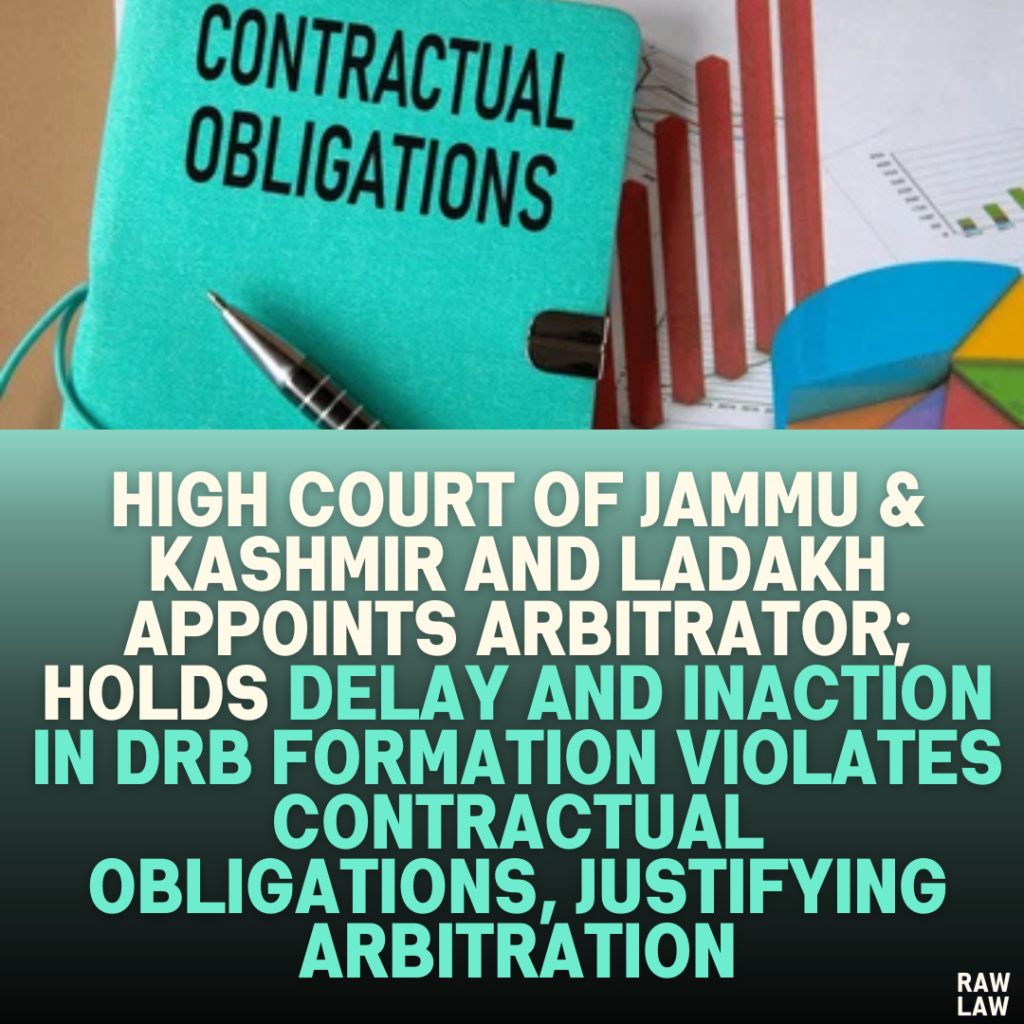Court’s Decision:
The High Court appointed Shri Vinod Sharma (Retd.), Chief Engineer, as the sole arbitrator to adjudicate disputes arising out of a contract between the petitioner and the respondents. The court held that the respondents’ failure to constitute and notify the Dispute Resolution Board (DRB) within the stipulated timeframe rendered the petitioner’s resort to arbitration permissible under Section 11(6) of the Arbitration and Conciliation Act, 1996.
Facts:
- The petitioner, a private construction company, entered into a contract with the respondents for constructing buildings under a tender for ₹42.73 crore.
- The contract stipulated a completion period of 30 months, but delays occurred due to the respondents’ failure to finalize locations and fulfill contractual obligations.
- Despite several extensions granted by the respondents, the work could not be completed by the petitioner due to delays in approvals and project site finalization.
- The petitioner sought dispute resolution under the DRB mechanism but received no response from the respondents, prompting a petition under Section 11(6) for appointing an arbitrator.
Issues:
- Whether the petition under Section 11(6) of the Arbitration and Conciliation Act is maintainable despite the existence of the DRB mechanism.
- Whether invoking arbitration under Clause 70 is permissible when the contract remains incomplete or terminated.
- Whether the petitioner complied with the requirement of serving notice under Section 11(4)(a) of the Act.
Petitioner’s Arguments:
- The respondents failed to constitute the DRB within the stipulated time, rendering the mechanism ineffective.
- The petitioner duly issued notices invoking arbitration, satisfying the procedural requirements under the Act.
Respondent’s Arguments:
- The petitioner prematurely abandoned work and approached the court without exhausting the DRB mechanism.
- Clause 70 of the contract prohibits arbitration until completion or determination of the contract.
Analysis of the Law:
The court emphasized that:
- Clause 70 of the contract allows arbitration for unresolved disputes, provided the DRB mechanism fails.
- The respondents’ failure to constitute the DRB within the specified period violated contractual obligations, justifying the petitioner’s direct approach to arbitration.
- Procedural delays or omissions by the respondents cannot prejudice the petitioner’s rights under the arbitration agreement.
Precedent Analysis:
- The court referred to Pardeep Electricals and Building Pvt. Ltd. v. Union of India (2023), which held that failure to adhere to DRB obligations justified direct recourse to arbitration.
- It also relied on Mohinder Bros v. Union of India, where it was held that arbitration clauses prohibiting reference until project completion lose relevance once the contract period expires.
Court’s Reasoning:
The court reasoned that:
- The petitioner had exhausted statutory remedies by repeatedly approaching the respondents for DRB formation and arbitration.
- The respondents’ inaction and failure to comply with the contract terms created disputes that necessitated arbitration.
Conclusion:
The court held that the petitioner was justified in seeking arbitration due to the respondents’ breach of the DRB mechanism. Shri Vinod Sharma (Retd.) was appointed as the sole arbitrator, with directions to conduct arbitration under the Act and deliver the award within the prescribed time.
Implications:
This judgment reinforces that procedural lapses by parties in fulfilling contractual obligations cannot bar arbitration. It highlights the courts’ inclination to facilitate dispute resolution in a timely manner, upholding the principles of justice and expediency in arbitration.




Pingback: Supreme Court: State Cannot Invoke Doctrine of Adverse Possession to Claim Ownership of Private Property Against Citizens; Upholds Plaintiffs' Ownership Based on Revenue Records - Raw Law